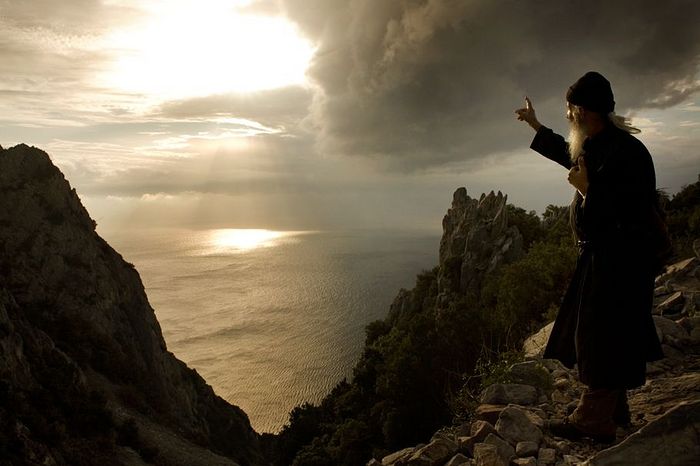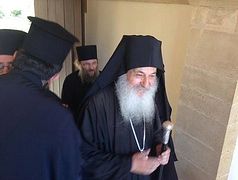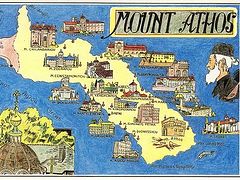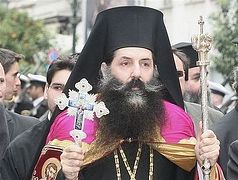Source: Katehon
June 3, 2016
The Holy Kinot (central administrative body of Mount Athos) held an emergency meeting on May 25 described as “exceptional” (because it was attended by priests and representatives of all 20 monasteries of Mount Athos), and wrote an open letter to the Patriarch of Constantinople, Bartholomew I on the eve of the Pan-Orthodox Council. The letter contains a series of critical remarks concerning the provisions of the ecumenical conciliar documents, as well as some of Patriarch Bartholomew's actions.
Ref.no.: F.2/7/1085
Karyae, 12th/25th May 2016
His Most Reverend All-Holiness
The Ecumenical Patriarch Bartholomeos
The Phanar
Most Holy Father and Master,
With deep filial veneration of Christ's Resurrection, we are glad to greet your All-Holiness with the words “Christ is Risen.”
According to the precepts of our holy places, we agreed to hold an extraordinary meeting of the representatives and superiors, piously taking into account:
a) Your Patriarchal letter of March 11, 2016, which notified our Holy Community about the upcoming convocation of the Holy and Great Council and included for reference six prepared documents of the Holy and Great Council.
b) Your Patriarchal and Synodal Encyclical Letter dated this year, March 20, which offered first and foremost the purposes of the Pan-Orthodox Council “to show that the Orthodox Church is the One, Holy, Catholic and Apostolic Church, finds unity in the sacraments, above all in the Eucharist and Orthodox faith, as well as in catholicity,” and declared that “the agreed upon common Orthodox level and submitted for the Holy and Great Council documents are published and made available to all benevolent-minded believers for their awareness and notification, including that they can express their opinions and expectations over the Holy and Great Council.”
Responding to the paternal urge of your Divine All-Holiness, we diligently pray with everyone and the Athonite fathers to the One True God, our Risen Lord Jesus Christ, to bless and point the right direction for the important work of the Holy and Great Council for the benefit of His Church, and in fact to reveal the unity of our Holy Orthodox Church as the Holy, Catholic and Apostolic Church.
Having studied with attention and diligence the text submitted for the Council, we intend to provide the following considerations.
We respect and properly honor our Mother the Great Church of Christ, and you - the Ecumenical Patriarch and our Father. We continually pray for the martyrs of this ancient Church and support the Ecumenical Patriarchate in its continued bearing of a heavy cross. At the same time, when there are issues burdening the [conciliar] consciousness of the Holy Orthodox Church, we, with filial reverence and love, as did our predecessors, reverently express our opinions and suggestions.
We note the strenuous and commendable efforts of the representatives of the Holy Orthodox Church as part of preparatory meetings for the Pan-Orthodox Council, aimed at the production of the draft texts submitted to the Council, which were published by the decision of the venerable Primates (January 21-28, 2016).
However, we believe that some paragraphs of the text submitted to the Council need to be clarified in order to clearly manifest the enduring tradition of the Holy Fathers of the Church and the catholic heritage. We humbly present our views and make suggestions for the trial and evaluation of the Church on these issue.
The first refers to ecclesiology. The statement: “The Orthodox Church, being the One, Holy, Catholic and Apostolic Church” is rightly taken out as a title at the beginning of the document with the title The Orthodox Church's Relations with The Rest of the Christian World as a sign of its exclusivity. At the same time, the Holy and Great Council, as a higher authority than the preceded meetings, should be complemented by the wording of the relevant text and avoid the use of the term “Church” with regard to the non-Orthodox, and instead use the term “Christian confessions and faiths.” Thus, the non-Orthodox will clearly understand that we, the Orthodox, think of them as their sincere interlocutors. In this respect, it would be more accurate to enter in the second sentence of the sixth paragraph of the text the words “Orthodox Church states (instead of “recognize”) [1] existence of other Christian confessions...”
Further, the concept of the unity of the Church also needs to be clarified. We believe that this unity includes only members of the Orthodox Church, to form the body of Christ, implicated “glory” (worshipful grace of the Holy Spirit), which our Lord Jesus Christ prayed in His high priestly prayer. Only they say “they may be one as we are one”, in the interpretation of God-bearing Fathers (Athanasius, St. John the Evangelist and St. Cyril of Alexandria). This will be all for the good and benefit as the self-consciousness of the Orthodox congregation and non-Orthodox, if we talk about the return of the One Holy Catholic and Apostolic Church, or, in our opinion, the Holy Orthodox Church, which firmly holds “the indissoluble link between the right faith and communion in the sacraments,”[2] as it was expressed by the holy Ecumenical Councils.
Considering this sense of unity, the Church “is always to develop a dialogue with those detached from it, near and far” and it is within this framework can be expressed in its apostolic nature “under new historical conditions” [3] with the explicit aim of facilitating their return to its sacred and spiritual unity. More specifically, we propose that the last sentence of Article 5 on the “lost unity of Christians” would sound in the formulation of a “return to the truth of fallen away from it (the Church) Christians.”
The second that should be amended to reflect the abiding consciousness of the Church is the text that reports on bilateral and multilateral inter-Christian dialogues. The way and the very course of theological discussions do not inspire calm for the whole fullness of the Church, and our sacred community at different times due to different circumstances expressed its opinion in the official documents against the theological agreements with non-Orthodox, protesting against joint prayers and other liturgical actions (in particular, kissing at the Liturgy), thereby creating the false impression of unity with them, as referred to in the document of our meeting priors (ΕΔΙΣ) on 9/22 April 1980. More specifically, Article 18 of the document “On the Orthodox Church's Relations with the Rest Christian world”, after the words “the Orthodox Church cannot accept the unity of the Church as a kind of inter-creeds compromise” shall be added “or as participation in joint prayers and other liturgical actions”, which causes confusion in the consciousness of the fullness of the Orthodox Church. In addition, we cannot but express our concern about sharp and fair objections to the continued participation of the Orthodoxy in the “World Council of Churches” (WCC).
The third is about the “Rules of organization and operation of the Orthodox Church and the Holy and Great Council”. We understand all the complexity, and therefore are not commonly concerned, which makes us a way of organizing and equal participation of bishops. However, Article 22 of “The relationship of the Orthodox Church with The Rest Christian World”, which refers to “the highest Church criterion in matters of faith”,[4] could be clearer if it was further explained that Church Tradition recognizes as the supreme criterion of faith the [conciliar] consciousness of the Church, which in some cases is expressed by individuals or assemblies of bishops or believers, and which is then approved by conciliar decisions.”
We also believe that the decision of the Holy and Great Council should include references to the Great Council of the Orthodox Church that followed the Holy Seventh Ecumenical Council (when Photios the Great (879), when St. Gregory Palamas (1341-1351) and those that proclaimed null and void the Lyons and Florence fake-Councils of Unions), in respect of these councils noted dogmatic and ecclesiological differences with non-Orthodox (filioque, creaturely grace, papal primacy, etc.) so that they were completely clarified.
The fourth is the last of the selected points associated with the spirit of the document The Mission of the Orthodox Church in the Modern World. This text is different through spiritual subtlety, even though we, the Holy Mountain, being the heirs of the ascetic tradition of holy silence, we believe that it could be very successfully completed (preferably in paragraph 6 or 13) a detailed presentation of the Orthodox anthropology and cosmology in its form, in which it was formulated by St. Gregory Palamas. More specifically, this could be amplified with:
“God may open to man and to join with him in direct communication, when the latter strive for masteries for Christ, constantly recover him with mental prayer. The aim of this strict and sacred spirituality is a deification, a personal experience and praying the Divine Light of the Transfiguration. An indispensable condition for this is the fact that this personal perfection, expressed in communion with God and His revelation, occurred only in the Church. All this selfless abuse occurs only with the grace of God, and in any case, it is not separated from it (especially not with the use of different techniques, found in some ancient and modern occult movement or by the autonomous development of the human mind and knowledge).
Within this framework, the central place is occupied by the argument of the essence and uncreated energies of God. God is not inaccessible to a man, but enters into a direct relationship and a personal relationship with him through his uncreated energies. Thus, the person becomes involved in the divine life and becomes a God by grace. God's energy is not some undefined force or a superpower, it is a live threefold in the people of God, which is available to the person who can receive His communion, it is part of its history and life, so that he “became a communicant of the divine nature”, carrying “in image” and striving to be “like Him” by deed, the virtue life and get rid of passions.”
The world for Christ comes through a worshipful way to a man's heart, “highest world", which should be opposite to the concept of inner mundane world, achieved through interfaith initiatives and activities.
Most Holy Father and Master,
Deeply appreciating the efforts of people who work for the preparation of the Pan-Orthodox Council, we can say in conclusion that the documents prepared for submission to the Council require some improvements that are needed in order to better express our conciliar consciousness of our Holy Orthodox Church. We request, among others, to taken into account and set forth herein proposals developed by us deliberately, carefully, and prayerfully so that the Holy and Great Council “has become a true expression of the canonical tradition and continuing the church doing through the work of the cathedral of the system” [5] of Church. Then comes a great joy in heaven and on earth and will overcome the possible quarrels and splits, and all the fullness of the Church “with one mouth and one heart” glorify the Most Holy Trinity of God as a hope for the world salvation.
We end our letter by offering fervent prayers to the Risen Lord for Your Divine Holiness and for a favorable outcome to the scheduled convening of the Holy and Great Council of staying in the deepest respect and filial devotion
—All the Representatives to the common Synaxis and Superiors of the twenty Holy Monasteries of the Holy Mountain of Athos.





Our beloved and Holy Monistries are a light to the pilgrims , unfortunately the vast amount of building restoration being carried out is funded by dark money. It is to late to go back now. As with all mistake made by the holy fathers, pray for forgiveness in needed and should be done. Christianity is bent over with the heavy cross of dark money. Dark money in the time of glodilazition is a force mentioned time again in the holy books. Lord Jesus Christ son of God have mercy on me a sinner.
Christopher Matthews
Baptised by The Holy Father of Holy Mother Church Alexandria Egypt 1946.